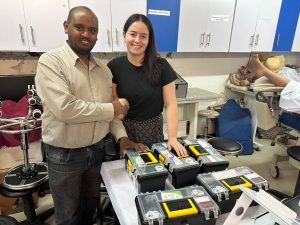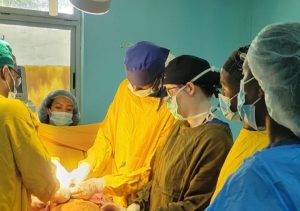
Hawassa, Ethiopia, a city of approximately 250,000 people, located 270 kilometers south of Addis Ababa, is home to the Hawassa University Comprehensive Specialized Hospital (HUCSH). This institution serves a catchment area of 18 million people and performs around 7,500 surgeries annually. During a three-week clinical elective at HUCSH, I had the opportunity to work closely with General Surgery residents and faculty surgeons, gaining valuable insights.
The surgical residents at HUCSH undergo four years of residency training after a general internship and several years of practice as General Practitioners. Each cohort consists of approximately ten residents, predominantly male, who reside on hospital grounds and frequently take 24-hour duty calls. During my stay, I participated in morning sign-outs, rounds with residents and faculty, outpatient clinics, elective and emergent surgical cases, and duty call days.
I was deeply impressed by the extensive knowledge of the HUCSH residents. As a referral center for complex cases, the hospital handles a wide range of subspecialty cases, including Plastic Surgery, Neurosurgery, Urology, Vascular Surgery, Pediatrics, and Hepatobiliary Surgery. It is common for residents to manage and perform surgery on patients with a wide variety of conditions such as open skull fractures, obstructive hydronephrosis, and appendicitis, often without the attending physicians. Despite the demanding call schedule and the challenge of balancing general and subspecialty surgeries, residents are up to date on current medical literature and can jump between a variety of topics ranging from gastric cancer management to recurrent laryngeal nerve injury to treatment of depressed skull fractures.

The adaptations made in a low-resource environment were evident across all facets of medical care, particularly in the operating room. I observed a Whipple procedure for distal cholangiocarcinoma performed by three residents and a single Hepatobiliary surgeon. Due to the limited resources, we scrubbed at a shared sink with a single piece of bar soap and proceeded to one of the six operating rooms. The rooms were lit by a single OR light and frequent power outages disrupted the procedure. Without air conditioning, the operating room windows were left open allowing flies, ants, and roaches to enter the OR. Sterility practices varied significantly compared to the United States; items considered disposable in the U.S. were often sterilized and reused, including electrocautery devices, even when showing significant signs of wear. Despite these challenges, the HUCSH residents and faculty delivered effective and appropriate surgical care demonstrating their resilience and dedication to their patients.
This experience was profoundly eye-opening and humbling, providing a unique perspective on medical practice in a resource-limited setting. Working with the team at HUCSH was not only inspiring but also a once-in-a-lifetime opportunity that enriched my understanding of global healthcare challenges and the remarkable adaptability of medical professionals in diverse settings.
Dr. Hillary Johnson is a general surgery resident.